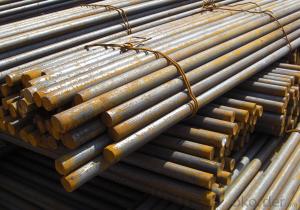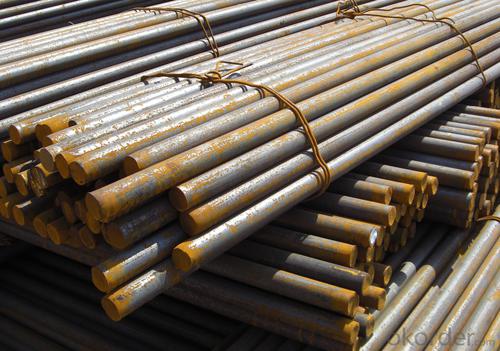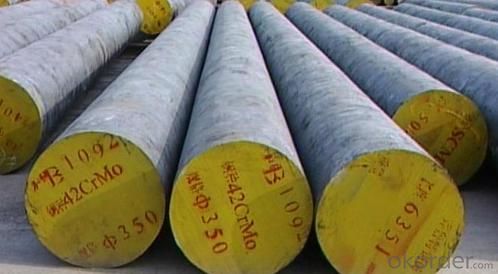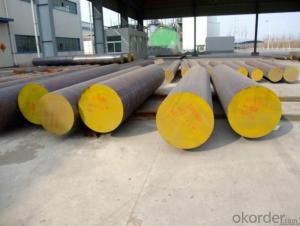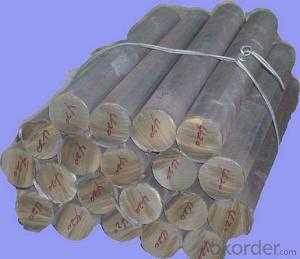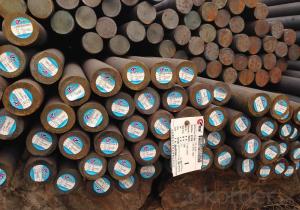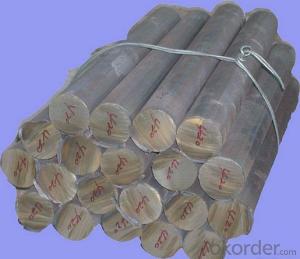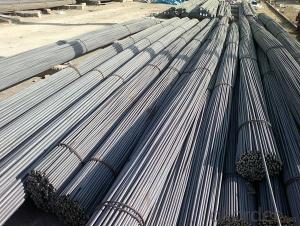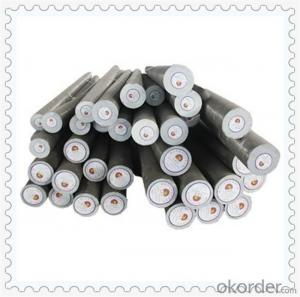Hot Rolled Structural Steel Round Bar 25MoCr4/1.7325
- Loading Port:
- China main port
- Payment Terms:
- TT OR LC
- Min Order Qty:
- 25 m.t.
- Supply Capability:
- 10000 m.t./month
OKorder Service Pledge
OKorder Financial Service
You Might Also Like
Specification
The details of our Steel
1. Produce Standard: as the GB, AISI, ASTM, SAE, EN, BS, DIN, JIS Industry Standard
2. Produce processes: Smelt Iron -EAF smelt Billet - ESR smelt Billet -Hot rolled or forged get the steel round bar and plate
3. Heat treatment:
Normalized / Annealed / Quenched+Tempered
4. Quality assurance:
All order we can received Third party inspection, You can let SGS, BV,.. and others test company test and inspect our products before Goods shipping.
Product information
Designation by Standards
| Brand Name | LH No. | Mat. No. | DIN | AISI |
| 25MOCR4 | 782 | 1.7325 | 25MoCr4 | 8625 |
Chemical Composition (in weight %)
| C | Si | Mn | Cr | Mo |
| 0.25 | 0.30 | 0.70 | 0.50 | 0.50 |
Description
Steel intended for direct hardening.
Applications
Gear components of all kind, link components, arbors, axles, bolts, bushes, coupling boxes for direct hardening.
Physical properties (avarage values) at ambient temperature
Modulus of elasticity [103 x N/mm2]: 210
Density [g/cm3]: 7.85
Soft Annealing
Heat to 650-700oC, cool slowly. Intermediate annealing: 650-680oC.
Carburizing
Temperature: 900-950oC, water, oil or hot quenching 160-250oC.
Core Hardening
Temperature: 890-920oC.
Surface Hardening
Harden from a temperature of 780-820oC followed by water or oil quenching.
Tempering
Tempering temperature: 150-210oC.
Product show

Workshop show

- Q: How does special steel contribute to the telecommunications aftermarket industry?
- Special steel contributes to the telecommunications aftermarket industry by providing durable and high-quality components for various telecommunications equipment. This steel is used in the manufacturing of antennas, towers, cables, and other crucial parts, ensuring the reliability and longevity of the telecom infrastructure. Additionally, special steel's unique properties, such as corrosion resistance and high electrical conductivity, enhance the performance and efficiency of telecommunications systems, enabling seamless connectivity and better communication services.
- Q: How does stainless steel contribute to the construction industry?
- Stainless steel contributes to the construction industry by providing durability, corrosion resistance, and aesthetic appeal. It is widely used in structural applications, such as building facades, bridges, and roofing, as it can withstand harsh weather conditions and maintain its strength over time. Stainless steel's resistance to corrosion also makes it a suitable choice for plumbing, electrical, and HVAC systems, ensuring longevity and minimizing maintenance. Additionally, its sleek and modern appearance enhances the overall aesthetics of architectural designs.
- Q: How is ultra-high-strength alloy steel used in the aerospace industry?
- Ultra-high-strength alloy steel is extensively used in the aerospace industry due to its exceptional strength-to-weight ratio. It is commonly employed in the manufacturing of aircraft components such as landing gear, engine mounts, and structural parts. This steel's remarkable strength helps enhance the overall structural integrity of aircraft, ensuring they can withstand extreme conditions and stresses encountered during flight. Additionally, its lightweight nature contributes to reducing the weight of the aircraft, which in turn improves fuel efficiency and increases payload capacity.
- Q: How does special steel perform in high-temperature fatigue?
- Special steel is renowned for its outstanding performance in conditions of high-temperature fatigue. When exposed to elevated temperatures, special steel demonstrates qualities such as remarkable strength, exceptional resistance to creep, and superior thermal stability. These characteristics render it highly dependable and capable of enduring extended periods of exposure to extreme temperatures without significant deterioration in performance. One of the key factors contributing to special steel's exceptional performance in high-temperature fatigue is its distinct composition. Typically, it contains alloying elements like chromium, molybdenum, and vanadium, which enhance its strength at high temperatures and resistance to thermal fatigue. These alloying elements create stable carbides and nitrides that aid in preserving the material's structural integrity even under intense heat and cyclic loading. Furthermore, special steel undergoes specialized heat treatment procedures, such as quenching and tempering, to further enhance its properties in high-temperature fatigue. These treatments augment the material's microstructure, resulting in increased strength, toughness, and resistance to thermal fatigue. In conditions of high-temperature fatigue, special steel exhibits remarkable fatigue strength and durability, even when subjected to cyclic loading at elevated temperatures. Its high-temperature fatigue limit surpasses that of regular steel significantly, enabling it to withstand repetitive stress and strain without experiencing premature failure. This makes special steel an ideal choice for applications involving high-temperature environments, such as gas turbines, heat exchangers, and aerospace components. To conclude, special steel delivers exceptional performance in high-temperature fatigue conditions due to its unique composition, specialized heat treatment processes, and superior mechanical properties. Its high strength, resistance to creep, and thermal stability make it a reliable and long-lasting material for applications requiring prolonged exposure to extreme temperatures.
- Q: What are the applications of special steel in the nuclear supply chain?
- Special steel has various applications in the nuclear supply chain due to its unique properties. It is commonly used in the construction of reactor vessels, steam generators, and fuel assemblies. Special steel is chosen for these applications because of its high strength, corrosion resistance, and ability to withstand extreme conditions such as high temperatures and radiation exposure. Additionally, special steel is used in the production of nuclear fuel, as it ensures the safe containment and transportation of radioactive materials. Overall, the use of special steel in the nuclear supply chain is crucial for the safe and efficient operation of nuclear power plants.
- Q: How is maraging steel used in the production of rocket and missile components?
- Maraging steel is utilized in the manufacturing of rocket and missile components due to its exceptional strength, toughness, and resistance to fatigue and stress. Its unique properties make it ideal for critical parts such as pressure vessels, casings, nozzles, and structural elements, where high-performance materials are required to withstand extreme conditions during launch and flight. Maraging steel's ability to maintain its integrity under intense heat, pressure, and vibrations makes it a crucial material for ensuring the reliability and safety of rocket and missile systems.
- Q: Can special steel be used in the food processing industry?
- Yes, special steel can be used in the food processing industry. Special steel, such as stainless steel, is commonly used in food processing equipment and utensils due to its corrosion resistance, durability, and ability to maintain hygiene standards. It is suitable for applications that require frequent cleaning, exposure to moisture, and contact with food, ensuring the safety and quality of food processing operations.
- Q: What are the different non-destructive testing techniques used for special steel?
- There are several non-destructive testing (NDT) techniques that are commonly used for special steel to ensure its quality and integrity without causing any damage. These techniques are essential in industries where special steel is used, such as aerospace, automotive, and construction, to ensure that the material meets the required specifications and standards. Some of the commonly used NDT techniques for special steel are: 1. Ultrasonic Testing (UT): This technique involves the use of high-frequency sound waves to detect internal flaws, such as cracks, voids, or inclusions, in special steel. UT is highly effective in detecting subsurface defects and is widely used due to its versatility and accuracy. 2. Magnetic Particle Testing (MT): MT is a technique that uses magnetic fields and iron particles to detect surface or near-surface defects in special steel. It is particularly useful in identifying defects like cracks, seams, or laps, as the magnetic particles will accumulate at these locations, making them visible under proper lighting conditions. 3. Liquid Penetrant Testing (PT): PT is a widely-used method for detecting surface defects in special steel. It involves applying a liquid penetrant to the surface of the material, which seeps into any surface cracks or defects. After a specified time, the excess penetrant is removed, and a developer is applied to make the defects visible. 4. Eddy Current Testing (ET): ET utilizes electromagnetic induction to detect surface or near-surface defects in special steel. It is particularly useful in detecting cracks, corrosion, or metal loss in conductive materials. ET is a fast and accurate method, making it suitable for high-speed production environments. 5. Radiographic Testing (RT): RT involves the use of X-rays or gamma rays to examine the internal structure of special steel. It can detect various defects, including porosity, inclusions, and cracks. RT provides detailed images that help identify the location, size, and severity of defects. 6. Visual Testing (VT): VT is a simple yet crucial technique that involves a visual examination of the surface of special steel. It helps identify surface defects like scratches, dents, or corrosion. Although VT is not as sensitive as other NDT techniques, it is often used as a preliminary inspection method. Each of these non-destructive testing techniques has its own advantages and limitations. The selection of the appropriate technique depends on factors such as the type and size of the special steel, the required inspection depth, and the specific defects that need to be detected. By using a combination of these techniques, manufacturers and inspectors can ensure the quality and reliability of special steel products.
- Q: How does special steel compare to other materials such as aluminum or titanium?
- Special steel, when compared to other materials such as aluminum or titanium, offers a unique set of advantages and characteristics. Firstly, special steel is known for its exceptional strength and durability. It has a higher tensile strength compared to aluminum and titanium, making it ideal for applications that require withstanding heavy loads or high-stress environments. This strength also provides resistance against wear and tear, ensuring a longer lifespan of the material. Another significant advantage of special steel is its ability to maintain its mechanical properties at extreme temperatures. While aluminum and titanium may experience a significant decrease in strength at elevated temperatures, special steel retains its structural integrity, making it suitable for applications that involve high temperatures or thermal cycling. In terms of cost-effectiveness, special steel often proves to be more affordable than titanium, especially in large-scale production. Although aluminum is generally cheaper than special steel, it may not possess the same level of strength or resistance to corrosion, which could limit its applicability in certain industries. Moreover, special steel has excellent machinability and can be easily formed into different shapes and sizes, allowing for greater design flexibility. This quality makes it suitable for various industries such as automotive, aerospace, construction, and manufacturing, where complex components or structures are required. Lastly, special steel exhibits superior corrosion resistance compared to aluminum and titanium. It can be treated or coated to provide additional protection against rust and other forms of degradation, extending its lifespan even further. In summary, special steel outperforms aluminum and titanium in terms of strength, durability, temperature resistance, and corrosion resistance. Its cost-effectiveness, machinability, and versatility make it a preferred material in various industries, where high-performance and reliability are crucial factors.
- Q: What are the casting methods for special steel?
- There are several casting methods used for special steel, including the traditional sand casting method, investment casting, and continuous casting. Each method has its own advantages and is chosen based on factors such as the complexity of the steel shape, desired surface finish, and production volume.
Send your message to us
Hot Rolled Structural Steel Round Bar 25MoCr4/1.7325
- Loading Port:
- China main port
- Payment Terms:
- TT OR LC
- Min Order Qty:
- 25 m.t.
- Supply Capability:
- 10000 m.t./month
OKorder Service Pledge
OKorder Financial Service
Similar products
Hot products
Hot Searches
Related keywords
